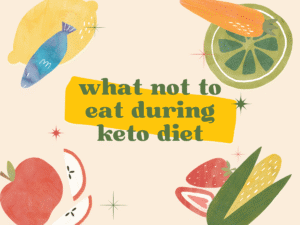This website contains affiliate links. If you make a purchase through these links, I may earn a commission at no extra cost to you. Learn More...
Keto diets can offer impressive benefits for some, but they are not suitable for everyone. You must consider various health factors before submerging into this high-fat, low-carb eating plan. This article will guide you through when you should not do the keto diet, outlining potential side effects, health risks, and specific conditions that may conflict with this dietary approach. By understanding these crucial considerations, you can make informed choices that support your overall well-being and dietary goals.
Overview of the Keto Diet
Before submerging into when you should not do the keto diet, it’s important to understand its fundamental principles. The ketogenic diet emphasizes high-fat, low-carbohydrate eating, which helps your body enter a state called ketosis. Here, your body shifts from burning carbs for energy to utilizing fat, promoting weight loss and potential health benefits. However, it’s imperative to consider your individual health circumstances before committing to such a strict dietary approach.

Definition and Historical Context
By definition, the keto diet focuses on drastically reducing carbohydrate intake while increasing fat consumption. Initially developed in the 1920s as a treatment for epilepsy, it gained popularity as a weight loss and health improvement strategy over the years. As you explore when to avoid the keto diet, it’s helpful to understand its origins and the reasons behind its effectiveness in certain populations.
Mechanisms of Action
On a biological level, the keto diet works by inducing ketosis, a metabolic state where your body converts fat into ketones for energy. This process occurs when carbohydrate intake falls below levels necessary for glucose production, prompting your body to seek alternative fuel sources. This shift can lead to significant weight loss and improved energy efficiency for some, but it’s not universally beneficial.
Indeed, while ketosis can enhance fat burning and provide stable energy levels, it may also present challenges for certain individuals. This metabolic change can lead to symptoms like fatigue, headaches, and digestive upset, collectively known as the “keto flu.” Additionally, the high fat consumption may not suit everyone, particularly those with existing health issues. Thus, being aware of the potential side effects and personal health risks is vital in determining when you should not do the keto diet.
Popular Variations of the Keto Diet
Overview of the keto diet reveals that several variations exist to cater to different lifestyles and health goals. These include targeted ketogenic diets, cyclical keto diets, and high-protein keto diets. Each adaptation modifies the macro ratios, allowing for some flexibility while still focusing primarily on low-carb eating.
The targeted ketogenic diet allows for a few more carbohydrates, making it suitable for athletes needing extra energy for high-intensity workouts. Cyclical keto involves alternating periods of strict low-carb days with higher-carb days, which can help mitigate some negative effects associated with strict adherence. Lastly, the high-protein keto diet increases protein intake while maintaining low-carb levels, offering another option for those who may struggle with fat consumption. As you weigh these variations against your needs, consider how they align with your health status and goals, especially regarding when you should not do the keto diet.
The Science Behind Ketosis
Some individuals may find the science behind ketosis intriguing, as it highlights how the body adapts to a low-carbohydrate diet. In this metabolic state, your body shifts from using glucose as its primary energy source to burning fat for fuel. Understanding this process can help you make informed decisions about when should you not do the keto diet.
What is Ketosis?
Before commenceing on a keto diet, it’s important to grasp what ketosis actually means. Ketosis is a metabolic state that occurs when your body has limited access to carbohydrates and begins to convert stored fat into ketones, which serve as an alternative energy source.
How the Body Transitions to Ketosis
Ketosis occurs when your carbohydrate intake drops significantly, typically below 50 grams per day. This shift prompts your body to deplete glycogen stores and start utilizing stored fats to produce ketones, a process that can take anywhere from several days to a week.
A sustained low-carb diet is imperative for transitioning into ketosis. Your body adapts over time, becoming more efficient at burning fat as it learns to produce and use ketones. Gradually reducing carb intake while increasing healthy fats can ease this transition and help mitigate potential keto diet side effects.
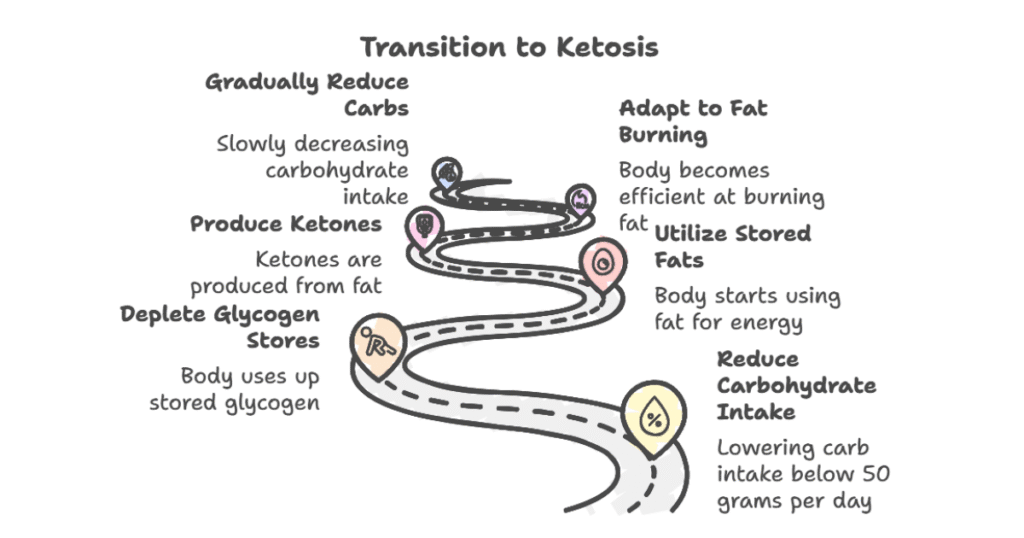
Measuring Ketosis: Tools and Techniques
About tracking ketone levels, understanding how to measure your state of ketosis can provide valuable insights into your progress. There are various methods to assess your ketone presence, including blood tests, urine strips, and breath analyzers.
With each measurement approach, you can gauge your levels of ketosis and assess whether your body is effectively transitioning into this fat-burning state. Blood tests, for instance, can offer immediate and precise readings, while urine strips provide a more accessible yet less sensitive option. Choosing the method that best fits your needs can enhance your understanding of when should you not do the keto diet.

Benefits of the Keto Diet
Once again, the ketogenic diet has captured the attention of many for its potential benefits. This low-carbohydrate, high-fat dietary approach can lead to significant improvements in various aspects of health, such as weight loss, enhanced mental clarity, and better metabolic control. However, understanding when you should not do the keto diet is equally important to ensure you reap its advantages without compromising your well-being.
Weight Loss and Body Composition
Along with its many benefits, many individuals find the keto diet effective for weight loss and improving body composition. By significantly reducing carbohydrate intake and increasing fat consumption, your body shifts to burning fat for fuel, often resulting in rapid weight loss. This metabolic change can help you achieve your weight loss goals effectively, so it’s crucial to consider your personal circumstances when evaluating when you should not do the keto diet.
Impact on Blood Sugar and Insulin Levels
For those managing blood sugar levels, the keto diet can positively influence insulin sensitivity. By limiting carbohydrates, you reduce blood sugar spikes, which is especially beneficial for individuals with diabetes or insulin resistance. However, it’s important to remain aware of your health status and consult with a healthcare professional regarding when you should not do the keto diet.
Consequently, maintaining consistent blood sugar control can lead to increased energy levels and reduced cravings, making it a popular choice for those seeking stability in their diet. The low-carb nature of keto means that your body relies less on glucose, resulting in steadier insulin levels. This can significantly improve your overall health, but monitoring your body’s response is important to avoid potential issues.
Potential Neurological Benefits
The ketogenic diet is often recognized for its potential neurological benefits, particularly in epilepsy management. It has been used historically to help control seizures, especially in children who don’t respond well to traditional medications. If you’re considering whether to begin on this diet, it’s important to weigh these benefits against when you should not do the keto diet.
Weight loss and improved cognitive function are among its secondary benefits, leading some to explore the diet for mental clarity and focus. The increase in ketones during ketosis may enhance brain function, making it a subject of interest in neurological research. However, if you have a history of eating disorders or specific health conditions, consult with a professional to ensure you’re making a safe choice.
When to Avoid the Keto Diet
Many individuals may need to reconsider the keto diet due to its restrictive nature and potential health risks. It’s important to familiarize yourself with the 7 Potential Dangers of the Keto Diet, which highlight the reasons why this diet may not be suitable for everyone.
Medical Conditions that Contraindicate Keto
After evaluating your health, it’s vital to consult a healthcare professional if you have conditions like pancreatic disease, liver problems, or thyroid issues. The high-fat content of the keto diet could exacerbate these health challenges and lead to serious complications.
Specific Populations
Below are certain groups who should carefully consider avoiding the keto diet: pregnant or breastfeeding women, athletes engaging in high-intensity workouts, and individuals with metabolic disorders. These populations need a diverse intake of nutrients for optimal health and performance, which the keto diet may limit.
In addition, pregnant or nursing women require a balanced diet to support their extra nutritional needs and those of their growing baby. Likewise, athletes often depend on carbohydrates for energy during intense workouts. Therefore, these populations should consult with their healthcare providers to create a tailored approach that meets their specific nutritional needs without restricting imperative food groups.
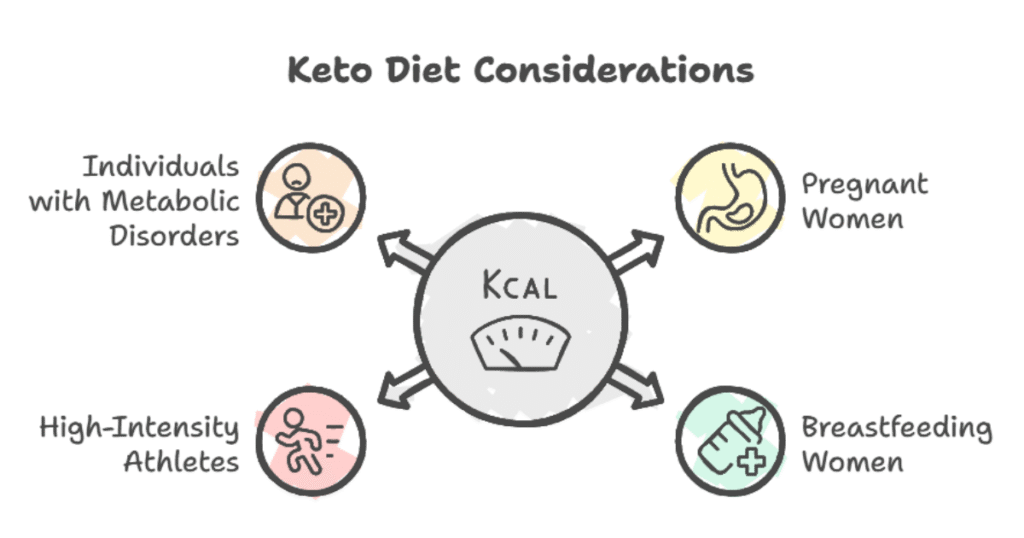
Individuals with a History of Eating Disorders
Adolescents and adults with a history of eating disorders should approach the keto diet with caution. The restrictive nature of the diet may trigger unhealthy behaviors or thoughts about food, leading to a detrimental cycle of obsession and deprivation.
Pancreatic health can also be affected, as individuals recovering from eating disorders may still be sensitive to dietary changes. It’s imperative to foster a positive relationship with food, and this may involve working with a nutritionist to develop a more balanced plan that avoids the pitfalls of restrictive diets like keto.
Nutritional Considerations
To successfully navigate the keto diet, it’s important to understand the nutritional aspects involved. You need to be mindful of your macronutrient ratios, ensuring that your diet predominantly consists of fats while maintaining adequate protein intake. This balance is crucial for entering and sustaining ketosis while also preventing potential negative health effects.
Understanding Macronutrient Ratios
For the keto diet, the typical macronutrient breakdown is about 70-75% fats, 20-25% proteins, and only 5-10% carbohydrates. This dramatic reduction in carbohydrates pushes your body into ketosis, enabling it to burn fat for fuel. However, strict adherence to these ratios is vital for achieving typical keto diet results, including weight loss and improved mental clarity.
Maintaining Nutritional Balance
One of the potential pitfalls of the keto diet is the risk of neglecting crucial vitamins and minerals. A well-rounded nutritional balance is important to support your overall health while on such a restrictive eating plan.
Ratios matter greatly when on the keto diet; however, you must prioritize variety within those parameters to ensure you are getting sufficient nutrients. This may include focusing on nutrient-dense fats, such as avocados and nuts, and incorporating low-carb vegetables. It’s vital to avoid processed foods high in unhealthy fats, which can lead to deficiencies and negatively impact your health over time. Striving for balance helps prevent the negative side effects associated with the keto diet, making it more sustainable in the long term.
Potential Nutrient Deficiencies
At the same time, you must be aware of potential nutrient deficiencies when following the keto diet. The restriction of certain food groups can lead to a lack of crucial vitamins and minerals.
But keeping a close eye on what you’re consuming is critical. Many people may experience deficiencies in key nutrients like fiber, potassium, and vitamins A and C due to the limited food sources available on a keto plan. Incorporating low-carb, nutrient-dense foods, along with a thoughtfully designed supplement regimen, can help mitigate these risks. If you suspect that the keto diet is not meeting your nutritional needs, consider consulting a healthcare professional for guidance tailored to your circumstances. Understanding when you should not do a keto diet can be integral to maintaining your overall health.
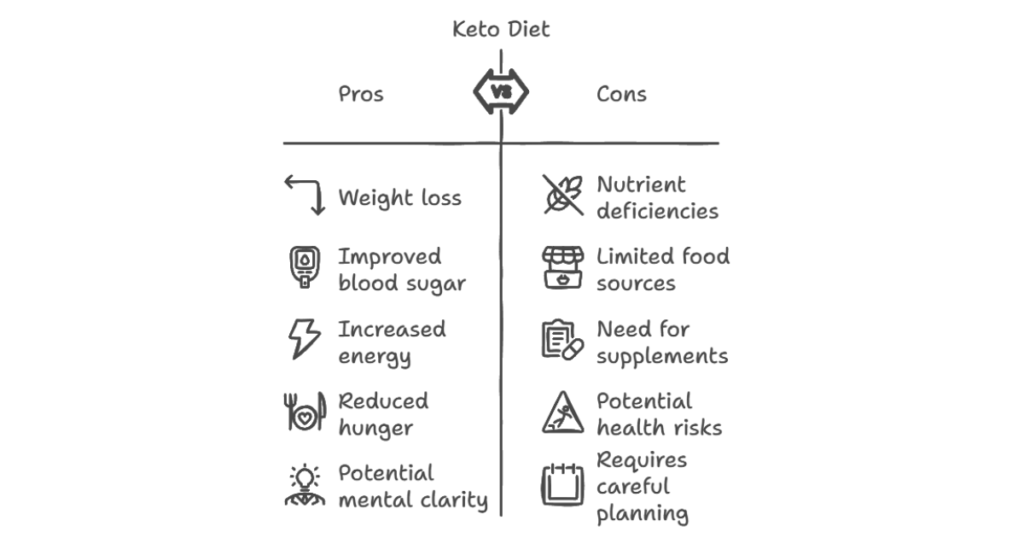
Potential Risks and Side Effects
Unlike some popular diets, the keto diet is not without its risks and potential side effects. The high-fat nature of the diet can lead to complications, especially for individuals with pre-existing health conditions. For a more detailed look at the risks associated with the ketogenic diet, refer to Ketogenic Diet – StatPearls. Understanding these risks is vital when considering whether to commence on this dietary journey.
The Keto Flu: Symptoms and Management
Symptoms of the so-called “keto flu” can include headache, fatigue, nausea, and irritability, typically occurring in the early stages of the diet. These symptoms arise as your body adjusts to burning fat for fuel instead of carbohydrates. Staying hydrated, replenishing electrolytes, and gradually reducing carbs may help alleviate these symptoms.
Long-term Health Concerns
About the long-term health concerns of the keto diet, studies suggest it may lead to nutrient deficiencies if not carefully managed. Restricting carbohydrate intake can limit your consumption of fruits, vegetables, and whole grains, which are necessary for overall health. Continuous monitoring of your health markers will be necessary to address any potential risks.
And while many individuals initially experience weight loss and other benefits, long-term adherence to a high-fat diet may negatively affect heart health due to increased cholesterol levels. Additionally, concerns have been raised about kidney and liver function as well as potential impacts on hormone balance, particularly for those with thyroid issues. It will be necessary to evaluate these factors with your healthcare provider.
Psychological Effects and Emotional Well-being
Before you consider the keto diet, it’s important to acknowledge its potential effects on your mental health. The restrictive nature of this eating plan can lead to feelings of deprivation or anxiety related to food choices. This could trigger negative thought patterns, especially for those with a history of eating disorders.
For instance, the keto diet may exacerbate obsessive thoughts around food, particularly in individuals who might already be predisposed to disordered eating patterns. If you find yourself struggling with what to eat or experiencing guilt around food, it might be beneficial to explore a more balanced and flexible approach to nutrition that fosters a healthier relationship with food.
Alternatives to the Keto Diet
Despite the growing popularity of the keto diet, it may not be the right fit for everyone. If you find that the strict carbohydrate limits are too challenging or if you experience negative effects, there are various dietary approaches you can consider. Exploring alternatives allows you to achieve your health goals without the constraints of keto, leading to a more sustainable and enjoyable eating experience.
Balanced Diet Options
With a balanced diet, you can embrace a variety of food groups that provide imperative nutrients without severe restrictions. Focus on whole foods such as fruits, vegetables, lean proteins, whole grains, and healthy fats to fuel your body. This approach not only supports overall health but also helps maintain a healthy weight, better digestibility, and sustained energy levels, which can be especially beneficial for those who may struggle with the keto diet side effects.
Other Low-Carb Diets
Options like the Atkins or Paleo diets offer lower-carb frameworks without the rigorous restrictions of keto. These diets allow for more flexibility and a wider variety of foods while still promoting reduced carbohydrate intake. By doing so, you can still benefit from weight loss and improved energy levels while minimizing the risk of potential keto diet health risks.
Diet plans within the low-carb spectrum can vary significantly in their structure and nutrient profiles. For instance, the Atkins diet emphasizes gradual carbohydrate reintroduction, while the Paleo diet focuses on whole foods, eliminating processed items entirely. Both approaches provide opportunities to tailor your eating habits based on personal preferences and nutritional needs, which may be more suited to individuals thinking about when should you not do the keto diet.
Importance of Individualized Nutrition
Diet is not a one-size-fits-all solution; what works for one person may not be appropriate for another. Personal factors such as age, activity level, metabolic rate, and health conditions should guide your dietary choices. Recognizing the importance of individualized nutrition can help you align your eating plans with your unique lifestyle, reducing the likelihood of negative side effects associated with the keto diet or any other restrictive diet.
Diets should be tailored not only to your goals but also to your personal taste preferences and lifestyle. By focusing on whole foods, listening to your body’s hunger signals, and consulting with healthcare professionals, you can establish a balanced approach that minimizes the risks of nutrient deficiencies and promotes overall well-being, especially if you are considering when should you not do the keto diet.
Social and Lifestyle Considerations
For many, the keto diet poses unique social challenges that can impact your ability to stick to it long-term. Social gatherings often revolve around food, and the high-fat, low-carb constraints of the keto diet may make it difficult to navigate these situations. Understanding when you should not do the keto diet can help you avoid feelings of isolation or frustration.
Adapting Keto to Social Settings
Among the most significant challenges of the keto diet is how to adapt it within social environments. Dining out or attending parties can become tricky when you’re trying to adhere strictly to your macro counts. Opt for meals with customizable options and communicate your dietary preferences to ensure you have suitable choices available.
Family and Peer Influence
Across various social circles, family and peer influence can play a considerable role when considering the keto diet. If your loved ones or friends are not supportive or are engaging in diets that promote high-carb foods, it may be challenging for you to remain committed to your low-carb goals.
But it’s vital to recognize how your family’s eating habits and social dynamics can shape your dietary choices. They can either encourage healthy eating or lead to feelings of guilt and pressure to indulge in less healthy options. Open conversations about your commitment to the keto diet can help set expectations and encourage support from those around you.
Sustainability of the Keto Lifestyle
To maintain a successful keto lifestyle, it’s vital to assess whether this dietary approach aligns with your everyday habits and preferences. Following a restrictive plan might initially lead to weight loss, but if it doesn’t fit into your lifestyle, it can become unsustainable over time. Acknowledging when you should not do the keto diet can save you from future headaches.
At the same time, consider how the keto diet affects your overall wellbeing. Some experience feelings of deprivation or struggle with maintaining social connections due to its strict nature. Evaluating your long-term health goals is necessary in deciding if a more balanced approach would work better for you, making it easier to integrate healthy eating into your lifestyle without compromising enjoyment or social interactions.
Transitioning Off the Keto Diet
Your transition off the keto diet should be a thoughtful process to maintain your health and avoid potential side effects. Gradually reintroducing carbohydrates while monitoring how your body reacts can help you adjust without overwhelming your digestive system or reviving unhealthy cravings. It’s imperative to stay mindful of your nutrition choices to ensure a balanced intake that supports your well-being.
Signs It’s Time to Stop Keto
Below are some key indicators that suggest it might be time to stop the keto diet. If you experience persistent fatigue, digestive issues, or a lack of mental clarity, these symptoms could indicate that your body is struggling with the high-fat, low-carb approach. Additionally, if you find yourself feeling socially isolated or obsessively calorie-counting, these feelings may signal that it’s time to reconsider your dietary choices.
How to Safely Transition Off
After deciding to transition off the keto diet, it’s important to do so gradually. Start by slowly increasing your carbohydrate intake, allowing your body to adjust without shocking your system. For instance, incorporating small portions of whole grains, fruits, and starchy vegetables can help ease the transition. Tracking your progress and staying attentive to how your body reacts will guide you in finding a new balance that upholds your health.
Indeed, a safe transition off the keto diet involves gradual increases in carbohydrates to avoid sudden weight gain or gastrointestinal discomfort. It’s best to introduce one type of carbohydrate at a time to monitor how your body responds. Focus on whole, nutrient-dense options, such as sweet potatoes, quinoa, and fruits, which provide imperative vitamins and minerals that your body needs, especially after a period of restricted intake.
Reintroducing Carbohydrates
Time has come to reintroduce carbohydrates gradually. Start with small amounts and consider their effects on your energy levels and overall well-being. This process can help you maintain balance without overwhelming your digestive system or triggering cravings for sugary foods.
Carbohydrates play a critical role in energy production, especially for those who engage in physical activities. As you reintroduce them, prioritize complex carbohydrates rich in fiber, which can help stabilize blood sugar levels and promote digestive health. This strategy will support your transition and ensure that your body becomes accustomed to the new dietary habits. Monitoring your progress and adjusting your carbohydrate intake will ultimately keep you aligned with your overall health goals.
Expert Opinions and Research Insights
Now, understanding expert opinions on the keto diet can help you make informed decisions about your health. Nutritionists and dietitians often emphasize individual needs and recommend tailored dietary approaches, especially for those considering the keto diet. By staying updated on the latest research, you can navigate potential health risks and identify when you should not do keto diet based on your personal circumstances.
Current Research on Keto Efficacy
Among the various studies conducted on the ketogenic diet, findings indicate both benefits and risks. While some research supports the diet’s effectiveness in weight loss and certain medical conditions, other studies highlight adverse effects, especially for people with specific health concerns. Staying informed about the latest literature is important in determining when you should not do the keto diet.
Perspectives from Nutritionists and Dietitians
Behind each dietary recommendation, there is often extensive research and professional insight. Nutritionists and dietitians agree that the keto diet might not be ideal for everyone due to its restrictive nature and potential health implications. If you have underlying health conditions or struggle with disordered eating, consulting a registered dietitian can guide you toward a more balanced approach that suits your lifestyle.
Research highlights that many nutritionists caution against the keto diet for individuals with eating disorders, as it may exacerbate unhealthy behaviors. Moreover, those with metabolic issues need personalized care, focusing on nutrient-dense foods rather than severe carbohydrate restriction. A professional’s guidance can assist in finding the best dietary path for you, especially when considering when you should not do keto diet.
Case Studies and Anecdotal Evidence
Across diverse case studies, the experiences of individuals on the keto diet yield valuable insights. Here is a list of case studies detailing outcomes related to the keto diet:
- Study on 50 individuals with obesity showing an average weight loss of 8 kg after 12 weeks on the keto diet.
- Research involving 30 athletes reporting decreased performance levels during a switch to a ketogenic regimen.
- Case study of a pregnant woman on keto experiencing nutrient deficiencies highlighted by decreased iron and calcium levels.
Efficacy varies widely among individuals on the keto diet, suggesting that personal factors play a significant role in outcomes. The aforementioned studies reveal that while some people may find success with weight loss and other health markers, others, particularly pregnant women and athletes, experience negative consequences. Always consider your own health needs and consult with experts before begining on the keto journey, especially if you see signs that indicate when you should not do keto diet.
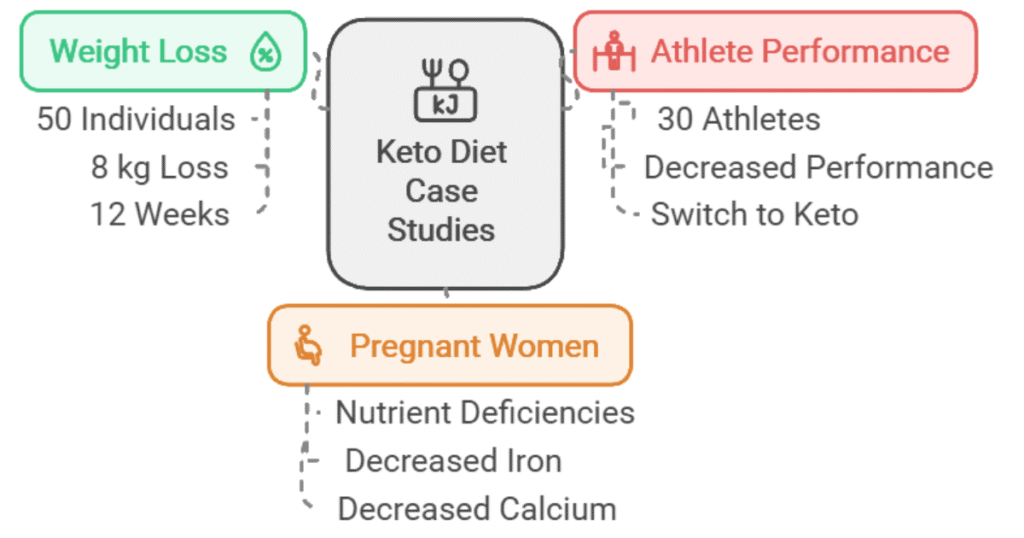
Common Myths About the Keto Diet
On your journey to understanding the keto diet, you might encounter several myths that misrepresent its principles and effects. For instance, many believe that all fats are bad, or that the diet guarantees immediate weight loss without effort. These misconceptions can lead to confusion about whether following this diet is right for you. It’s vital to differentiate fact from fiction to make informed decisions about your health.
Clarifying Misconceptions
The idea surrounding the keto diet often lacks nuance, leading to widespread myths that can misguide you. For instance, not all fats are created equal, and while the keto diet emphasizes high-fat intake, it’s vital to choose healthy fats over unhealthy ones. Understanding the biological processes involved in ketosis and the necessary balance of nutrition can help you navigate your choices more safely. Always consider the specific context of your health and goals.
About the keto diet, it’s commonly believed that it is solely about eating fat, but this oversimplification overlooks the need for a balanced approach, including potential nutritional deficiencies. You should also be aware that while keto may help some manage weight or improve mental clarity, its suitability can vary significantly based on personal health factors and lifestyle. Factoring in these elements is important when considering when should you not do keto diet.
Key Takeaways for Beginners
Besides understanding the restrictions and guidelines of the keto diet, it’s vital for you to recognize the importance of sustainability and enjoyment in your eating habits. The diet is not a one-size-fits-all approach; instead, it must align with your personal health goals and lifestyle preferences to be effective long-term.
With various keys to remember as a beginner, including the potential side effects and contraindications, it’s wise to prioritize a balanced dietary approach that nurtures your overall well-being. Engaging with healthcare professionals or nutritionists can help you identify whether the keto diet fits into your unique circumstances, as understanding when should you not do keto diet is key to long-lasting health outcomes.
Resources for Further Reading
Not everyone should initiate on the keto journey without sufficient knowledge. For a balanced view on the ketogenic lifestyle, consider exploring the Pros and Cons of the Ketogenic Diet. This resource provides insights into the keto diet’s potential risks and benefits, helping you to determine when should you not do keto diet.
Insights from Healthcare Professionals
On seeking guidance from healthcare professionals, you gain valuable insights into whether the keto diet aligns with your health objectives. Medical experts often emphasize the importance of personalized nutrition and managing existing conditions, making it clear that when you should not do the keto diet can vary greatly based on individual circumstances.
Plus, healthcare professionals often stress the risks of starting the keto diet without thorough medical evaluation, especially for those with metabolic disorders or a history of eating disorders. They recommend carefully weighing the benefits against potential health risks, such as elevated cholesterol levels or digestive issues, to make informed dietary decisions.
Conclusion: When Should You Not Do Keto Diet? Key Considerations for Your Health
Considering all points, you should carefully evaluate when you should not do the keto diet to protect your health. If you have specific medical conditions, a history of eating disorders, are pregnant or breastfeeding, or engage in high-intensity exercise, the keto diet may pose health risks. Additionally, be aware of potential side effects like nutrient deficiencies and digestive issues. Assess your lifestyle and nutritional needs, and consult with a healthcare professional to determine if the keto diet is right for you, ensuring that your eating habits are sustainable and supportive of your well-being.
Related Topics:
What Not to Eat During Keto Diet: Essential Guide for Success
Are Keto Diets Effective? Explore the Truth Behind Ketogenic Eating





